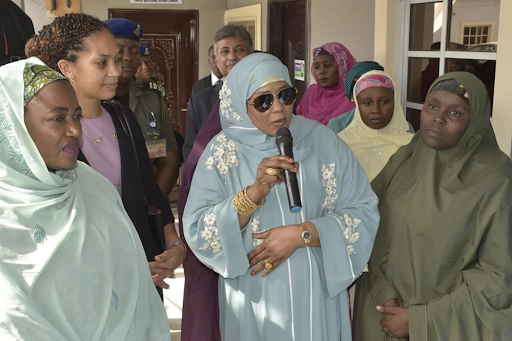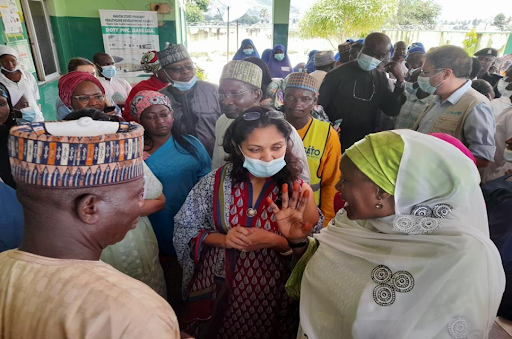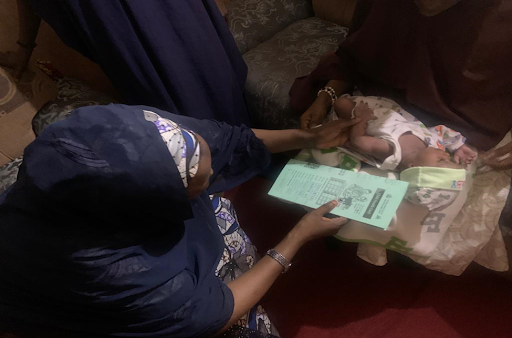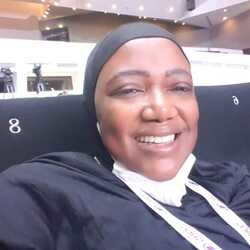Connecting Gender and Immunization in Bauchi State, Nigeria
The Boost Community highlights the stories of members committed to immunization work at the national and sub-national levels. The Boost Member Spotlight Series will regularly feature active Boost members who are engaged in relevant and innovative immunization activities in their contexts. If you have a story to share, please contact us at info@boostcommunity.org.
Alawiyatu Usman Ibrahim has dedicated her personal and professional life to highlighting and advancing the connection between gender and health. She first began working as a midwife over 30 years ago and later obtained am advanced education in nursing. becoming a District Coordinator for the Expanded Program on Immunization (EPI) in Bauchi State, Nigeria where she, supervised all immunization activities in Jama’are Local Government Area (LGA). Since 2021 she has served as the gender equality focal person with Bauchi State Primary Health Care Development Agency.

Conducting a Gender Assessment
In her current role, she and her team aim to integrate gender into the primary healthcare system in order to have gender mainstreaming in all healthcare activities. Alawiyatu said, “The issue of gender in my own context is a sensitive issue. There are a lot of gender barriers that prevent the uptake of immunization.” In 2022, shortly after taking on her new role as the gender equality focal person, Alawayatu’s team conducted a gender assessment to determine why men were vaccinated against COVID-19 at higher rates than women in Bauchi State. Through this investigative process, the team interviewed household heads (men), caregivers (women), and vaccination teams at local healthcare facilities in Bauchi State. They uncovered a plethora of useful information.
“We discovered that [women] don’t have the decision-making power. They don’t have agency,” said Alawiyatu. She further shared that women usually have to seek permission from their husbands for any decisions made regarding their health and the health of their children. Even if a husband gives his wife permission to seek immunization services, household duties often prevent women from having the time to bring their families to get vaccinated. Alwayatu said, “[The women] have a lot of clothing to wash. They have to take care of the small children.” Compounding this is a lack of access to information. Alawiyatu shared, “Men will go out. They have a small group in the community that they talk to. So, they get the information, but the women don’t have access to this important, correct information.” Further, she added, “We discovered that most of the men…are the ones that own the TV, they own the radio. They have time to listen to the radio, they have time to watch TV.”
Alwiyatu and her team concluded that there was a need to make men gender-responsive; in other words, that they understand that gender equality means giving equal opportunity, rights, and distribution of resources to all genders. Moreover, they use a gender lens in both their professional work and personal life. To do this, the team conducted training at program offices and health facilities to train service providers on becoming gender-responsive.
From there, they created a “mama-to-mama” support group for women. This group utilizes female volunteers to engage other women in house-to-house mobilization on immunization, identification of babies for immunization, tracking on immunization, and referral to health facilities for immunization. They established twenty women as “mamas” in each of the 323 political wards in the 20 local government areas of Bauchi State. Each volunteer was given training to go house-to-house mobilizing women on health education and vaccination. The volunteers were also tasked in identifying any “defaulters,” or children who had missed vaccinations; they would then be referred to a health facility to receive the appropriate catch-up vaccines.

Moreover, these volunteers were well-respected women in the same communities they were mobilizing, which ensured trust between volunteers and community members. Despite the women’s status as volunteers, Alawiyatu said, “They don’t mind doing this voluntary work, as long as it will help reduce maternal mortality and the issue of zero-dose children. They are always willing to give their support.”
Advancing the Health of Women and Girls
Alawiyatu is dedicated to advancing work opportunities for women outside of her formal job duties as well. She created a foundation with some of her family members called the Nananu Women and Youth Development Foundation. The Foundation aims to improve the education of girls and women, especially those living in poverty, in order to promote immunization and reduce maternal and childhood mortality in Jamaare Local Government Area of Bauchi State. “This gives me a lot of peace in my heart because there are a lot of things that I went through, as a woman, that I don’t want any girl, any woman, to suffer that kind of trauma that I went through. When a lot of it is common in our society, in our homes, in our community, in our working place, and other places,” said Alawiyatu.

Alwiyatu has been a Boost Community member since 2021, and her first formal engagement was as a participant in the 2022 Gender and Immunization: Opportunities for Action course, which she found useful in her daily work. From there, she continued joining other courses–most recently, the Advanced Community Activation Training course.
“I’m very happy and grateful to [have] join[ed] Boost,” Alawiyatu said. “The one thing I learned is they don’t discourage anybody. During the trainings, when we break into small groups, the others always encourage me. So I contribute… knowledge or anything I have. And I encourage a lot of people to join Boost. I tell them, ‘you will learn a lot.’ I’m very proud to be a member of this Community.”
Alawiyatu continues to look to the future of gender and immunization. She said, “This gender inequality is really, really affecting the uptake of immunization.” Despite making every effort to implement programs aimed at gender mainstreaming, she said, “It’s something that we’ll not see the results of immediately. It has to be gradually.”
Alawiyatu added, “A lot of people say it’s just a women’s issue. No. It’s an issue of men, women, boys, and girls. Everyone.”

Boost Member
As a Nurse hailing from Jamaare LGA, Bauchi State in Nigeria, Alawiyatu Usman Ibrahim proudly broke barriers by becoming one of the first women in her community to complete an education, defying all odds. This journey fueled her passion to champion gender equality, advocating for empowerment and education, particularly for girls in her region.
